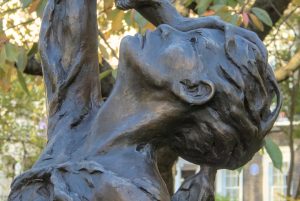Today, October 20, marks ‘Ngày phụ nữ Việt Nam’ – Vietnamese Women’s Day – a time to offer recognition and respect to Vietnamese women and celebrate their incredible economic, political, and social achievements. Yet despite their vital contribution to shaping Vietnamese societies, and although we have seen many improvements in women’s rights over the years, many Vietnamese women continue to face a life of prejudice, suffering, and injustice.
Unbeknownst to many, during the Vietnam War thousands of Vietnamese women were raped by South Korean soldiers. Some of the victims were as young as 12 at the time, and more than 800 are still alive. Many of these women and their children – known often as the “Lai Dai Han,” which means dual heritage – have spent their lives being shunned because of the stigma of their dual heritage, living in severe poverty, unable to read or write and with poor access to social services such as healthcare and education.
One of the survivors, Tran Thi Ngai, now a midwife in southern Vietnam, found her life forever altered one summer day in 1967. She was working in her parents’ shop when a man with “grenades hanging from his armor, guns on his belt,” entered the shop to buy soy sauce. As Tran reached for the money, he seized her arm and then her hair, dragging her into the back room of the shop where he raped her. Tran reflects that “it felt as if my life was over.” The ordeal left her pregnant with a boy, facing the judgment from her community, including her own parents.
Tran’s story took an even darker turn when another South Korean solider appeared, sent by Tran’s rapist to take her and the baby to his base. The following two years were marked by sexual abuse and relentless fear – “it was coercion, rape, no love was there,” she recalled – and her life was further complicated when she gave birth to another baby girl. Her trauma endured, and she felt that her social standing was irrevocably damaged.
The experiences of the Lai Dai Han community resonate with those of countless women in historic and modern-day wars and conflicts. There are believed to be thousands of Ukrainian women and children who have been subjected to sexual violence by Russian soldiers over the past year. In Sudan, there are reports of girls as young as nine being raped, and in Ethiopia, hundreds of sexual assaults have taken place since a peace agreement was signed in November last year. Worryingly, we are already hearing reports of rape by parties involved in the unfurling Israel-Hamas conflict.
Yet despite the unimaginable suffering they’ve faced, survivors are transforming their personal experiences into powerful advocacy efforts to effect positive change. For instance, SEMA is a network of global survivors that established the Global Survivors Fund to enhance access to reparations for survivors. Nadia Murad, a Yazidi woman who was forced into sexual slavery along with 6,000 other women and girls by ISIS militants, founded Nadia’s Initiative and has tirelessly campaigned for crimes of sexual violence to be prosecuted. The Justice for Lai Dai Han Campaign, led by former British Foreign Secretary Jack Straw, has harnessed the power of art as an advocacy tool, creating the “Mother and Child” sculpture, which pays tribute to the Lai Dai Han and proudly stands in St. James Square, London.
It takes an enormous amount of courage for survivors to speak about their traumatic experiences and demand action. The bravery shown by survivors who have already endured so much deserves to be met with the support from authorities that they so desperately need. Unfortunately, the Lai Dai Han and their mothers are yet to receive an apology from the government of South Korea, and worse yet, their own government continues to turn a blind eye to their suffering.
By law, the survivors are unable to talk about what happened to them, as the government of Vietnam wishes to put the past behind them and maintain its economic and diplomatic ties with South Korea. Through silencing the Lai Dai Han, they are denying them the opportunity to achieve justice and peace.
As we celebrate Vietnamese Women’s Day, we cannot leave the stories of the Lai Dai Han in the shadows. Advancing women’s rights and preventing future atrocities is contingent on rectifying the past. Around the world, there remain endless horrific accounts of sexual violence that are shrouded in silence. By amplifying the stories of the Lai Dai Han and survivors of historic war crimes worldwide, we can support the universal fight for recognition and justice. Through leading investigations into these atrocities, and holding perpetrators accountable, we can show an earnest commitment to eradicating the global issue of sexual violence in conflict, and finally, after 50 years of suffering, we can finally give the Lai Dai Han and their mothers the opportunity to move forward and heal.

































